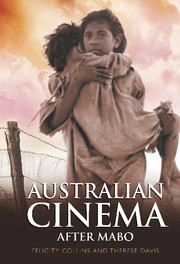Book contents
- Frontmatter
- Contents
- Acknowledgments
- Part 1 Australian Cinema and the History Wars
- 1 Backtracking after Mabo
- 2 Home and Abroad in Moulin Rouge, The Dish and Lantana
- 3 Elites and Battlers in Australian Rules and Walking on Water
- 4 Mediating Memory in Mabo – Life of an Island Man
- Part 2 Landscape and Belonging after Mabo
- Part 3 Trauma, Grief and Coming of Age
- Bibliography
- Index
1 - Backtracking after Mabo
Published online by Cambridge University Press: 31 January 2011
- Frontmatter
- Contents
- Acknowledgments
- Part 1 Australian Cinema and the History Wars
- 1 Backtracking after Mabo
- 2 Home and Abroad in Moulin Rouge, The Dish and Lantana
- 3 Elites and Battlers in Australian Rules and Walking on Water
- 4 Mediating Memory in Mabo – Life of an Island Man
- Part 2 Landscape and Belonging after Mabo
- Part 3 Trauma, Grief and Coming of Age
- Bibliography
- Index
Summary
Backtrack: (vb). 1. to return by the same route by which one has come. 2. to retract or reverse one's opinion, policy, etc.
The familiar yet estranged figure of the black tracker has enjoyed a certain longevity in Australian cultural traditions for it easily corresponds with the metaphor of exile and imprisonment in a purgatorial landscape, identified by Graeme Turner as one of the key tropes of Australian fiction. However, with shifts in the Australian social imaginary that accompanied the Land Rights movement of the 1970s, the tracker receded into the background, a result, perhaps, of a critique of racial stereotypes initiated by Aboriginal activists and critics. In 2001–02 the black tracker made an unexpected return to Australian screens in two feature films, Rabbit-Proof Fence (Phillip Noyce, 2002) and The Tracker (Rolf de Heer, 2002), and a short musical film, One Night the Moon (Rachel Perkins, 2001). In both features, an iconic actor of the 1970s, David Gulpilil, was cast in the role of the tracker. His startling, intense screen presence haunted Rabbit-Proof Fence and dominated The Tracker. After a period of relative obscurity (save for smaller roles in Crocodile Dundee, Peter Faiman, 1986; Until the End of the World, Wim Wenders, 1992; and Dead Heart, Nicholas Parsons, 1996), Gulpilil's return to the screen in two key films of the post-Mabo era, like the films themselves, can be understood as a kind of backtracking, a going over of old ground in Australian national cinema, a going over which reprises and at the same time retracts some of the seemingly intractable figures of Australian national identity.
- Type
- Chapter
- Information
- Australian Cinema After Mabo , pp. 3 - 21Publisher: Cambridge University PressPrint publication year: 2004
- 1
- Cited by



